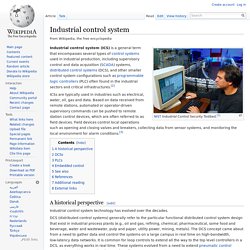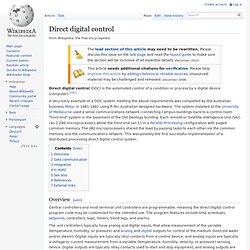

Industrial control system. NIST Industrial Control Security Testbed.[1] Industrial control system (ICS) is a general term that encompasses several types of control systems used in industrial production, including supervisory control and data acquisition (SCADA) systems, distributed control systems (DCS), and other smaller control system configurations such as programmable logic controllers (PLC) often found in the industrial sectors and critical infrastructures.[2] ICSs are typically used in industries such as electrical, water, oil, gas and data.

Based on data received from remote stations, automated or operator-driven supervisory commands can be pushed to remote station control devices, which are often referred to as field devices. Field devices control local operations such as opening and closing valves and breakers, collecting data from sensor systems, and monitoring the local environment for alarm conditions.[3] Direct digital control. Direct digital control (DDC) is the automated control of a condition or process by a digital device (computer).[1][2] A very early example of a DDC system meeting the above requirements was completed by the Australian business Midac in 1981-1982 using R-Tec Australian designed hardware.

The system installed at the University of Melbourne used a serial communications network, connecting campus buildings back to a control room "front end" system in the basement of the Old Geology building. Each remote or Satellite Intelligence Unit (SIU) ran 2 Z80 microprocessors whilst the front end ran 11 in a Parallel Processing configuration with paged common memory. SCADA. SCADA ( supervisory control and data acquisition ) is a type of industrial control system (ICS). Industrial control systems are computer controlled systems that monitor and control industrial processes that exist in the physical world. SCADA systems historically distinguish themselves from other ICS systems by being large scale processes that can include multiple sites, and large distances. [ 1 ] These processes include industrial, infrastructure, and facility-based processes, as described below: Industrial processes include those of manufacturing, production, power generation , fabrication , and refining, and may run in continuous, batch, repetitive, or discrete modes.
Infrastructure processes may be public or private, and include water treatment and distribution, wastewater collection and treatment , oil and gas pipelines , electrical power transmission and distribution , wind farms , civil defense siren systems, and large communication systems.